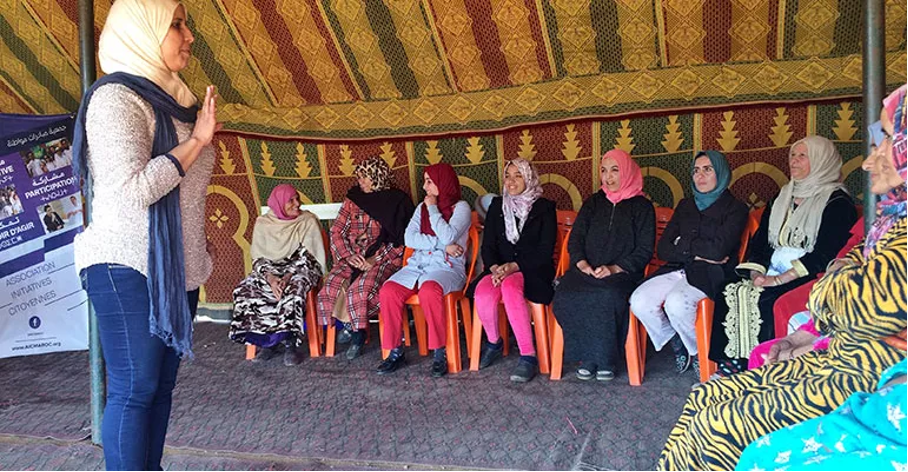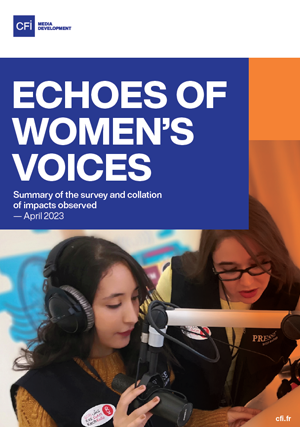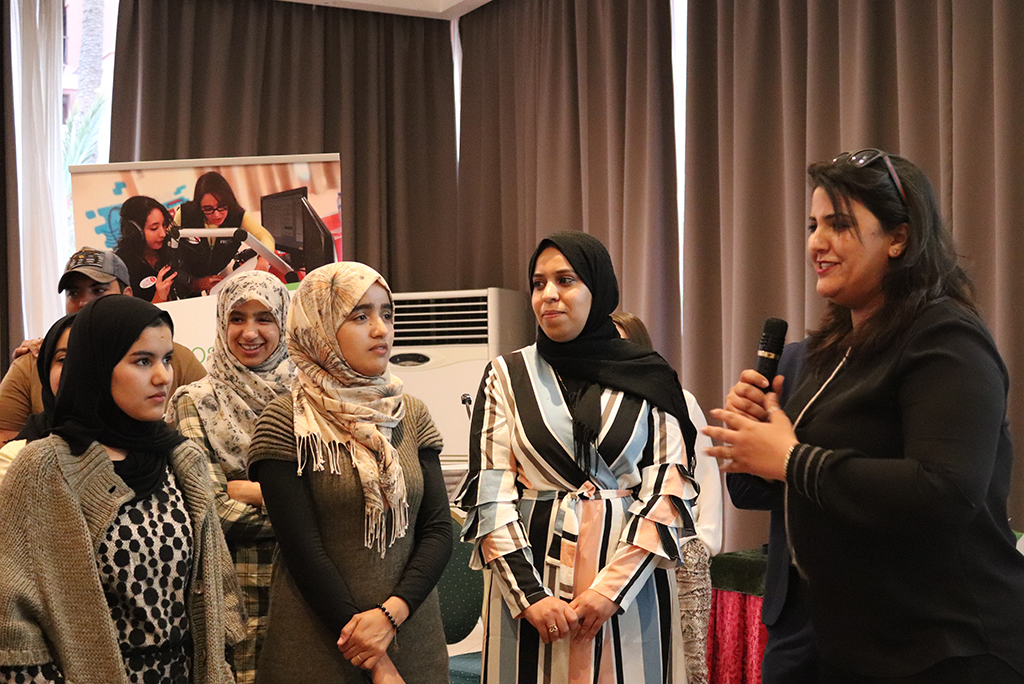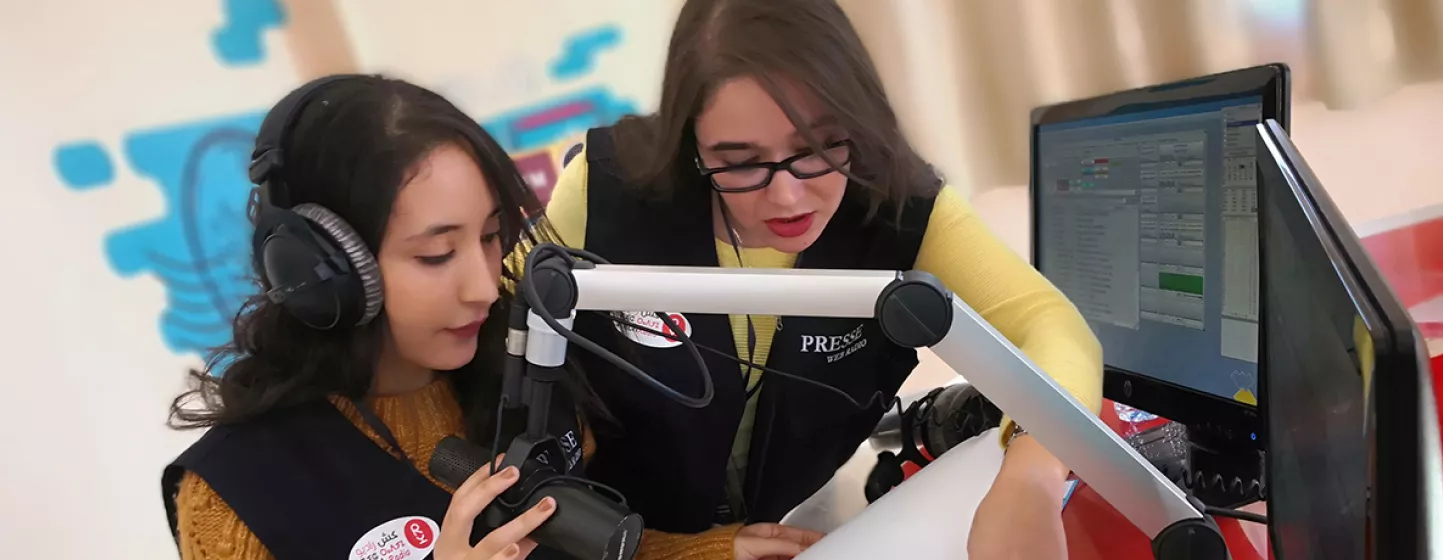What to remember about the impact of the project Echoes of women's voices
One year after its implementation, CFI published its first impact study on the project Echoes of Women's Voices, a project running from 2018 to 2022 in Morocco. What tangible impact has this had on young women in rural areas? Has their place in public debate been strengthened? Find out the results in this special report.
What is the purpose of an impact study?
For several years, CFI has been conducting ambitious media development projects aimed at combating misinformation, promoting gender equality, protecting the environment, and promoting democracy and civic engagement.
But until now, there have been few tools available to assess the progress made following the agency's interventions. In order to optimise its future projects, CFI has been commissioning specialist firms to carry out post-project impact studies since 2022. For the Echoes of Women's Voices project, carried out in the Marrakech-Safi region of Morocco, CFI selected the Ingeterri Group, a local consultancy firm, with a team comprising a mission leader with a doctorate in anthropology and lecturer at the University of Marrakech, an expert specialising in gender and social inclusion, and a researcher in engineering and territorial development. What are the objectives of this approach? To ensure total transparency on the impact of CFI's actions, and to further improve the effectiveness of its projects in favour of free, inclusive, and quality information.
Echoes of Women's Voices, a project dedicated to women in rural Morocco
This first impact study aims to assess the sustainability and effects of the Echoes of Women's Voices project, financed by CFI’ own funds, one year after its implementation.
The project aimed at increasing the participation of young Moroccan women from rural areas in public debate in the Marrakech-Safi region. To this end, CFI supported the production of innovative media content, produced by them, for them and in their languages, particularly in Amazigh, thanks to a mobile radio studio that has made it possible to reach out to women in these rural areas. The programmes produced were broadcast by "Kech Radio", the digital radio station of the Association Initiatives Citoyennes (AIC), the project’s beneficiary.

The impact study sought to identify the effects of the production of this content on the direct and indirect beneficiaries, as well as the changes observed in terms of women's participation in public debate and in the search for solutions to improve their equal rights.
Four categories of beneficiaries for a single project
Although the primary aim of the project was to enable young Moroccan women from rural areas to take part in public debate in the Marrakech-Safi region, the project benefited many more people than that.
To begin with, let's look at the impact on the project’s participants, who have benefited the most from it. These women all became aware of their ability to act and analyse, through discussions with the teams at awareness-raising workshops. Their confidence in the institutions has also been strengthened. They were able to obtain the information they needed about administrative procedures, the powers of elected representatives and the operation of cooperatives, employment opportunities, promotion of their products, etc., as well as their rights and duties. Thanks to the project, the women have been able to identify common problems, exchange information, work together to find appropriate solutions and change their relationships with the outside world by taking initiatives. Some women leaders have also believed in their power and have stood in local elections.
The second category of beneficiaries covers a broader spectrum, as it includes women from the Marrakech-Safi region, particularly from rural areas. The project has enabled them to benefit from support in their aspiration to achieve economic autonomy. The project has also helped to identify the processes of discrimination and segregation behind the testimonies collected and has given impetus to networking initiatives and exchanges with other non-profit radio stations, consultative bodies and elected representatives.

The third category of beneficiaries is, without doubt, the Association initiatives citoyennes (AIC), which supported the project via its digital radio station Kech Radio, and its entire team of employees and volunteers. Strengthening its editorial line, establishing a stronger regional base, guaranteeing the sustainability of its actions, improving its understanding of local contexts, but also consolidating its staff and their training: as a result of the project, the AIC is now firmly established.
Finally, the project has had a strong direct impact on Kech Radio's visibility and reputation, which has become a model to be replicated in other regions of the country, and even more widely in other North African countries, and on the implementation of a political strategy that takes greater account of girls and women in rural areas.
The beneficiaries’ feedback
They are journalists, researchers, activists, cooperative leaders and elected representatives, and they share how the Echoes of Women's Voices has changed their place in Moroccan public debate.
Hafsa, a community activist and director of the Amazigh social complex, wants to set up a new radio station. The Echoes of Women's Voices project was an opportunity for her to familiarise herself with non-profit radio, to get to know Kech Radio’s team and to decide to develop a radio station within the multi-service centre that she supervises. In the meantime, she plans to use mobile telephony to produce reports and collect personal accounts.
Saadia, who has a wealth of experience in non-profit organisations, began her political career in her local authority as vice-president of the Zawiya Ben Hamida local authority in the province of Essaouira, as did Fouziya, who was elected to the local council. Fouziya seeks to play a leading role in defending women's rights and encourage other young girls in her community to become politically active.
Nadia founded the Ouled Selman Women's Association in order to have a legal framework and join the province's non-profit networks, but also to speak on behalf of the women and defend their demands before public bodies. She is mobilising her association to help women benefit from workshops, meetings and training courses run by other associations in the Marrakech-Safi region.
Nl, director of the multi-service centre in Sidi Bou Othmane, has managed, through her association, to forge a partnership with L'Entraide nationale, to help young rural girls who have dropped out of school, as well as women in vulnerable situations, particularly divorced or widowed. The centre aims to integrate 74 women into working life.
Rc founded the tapestry cooperative in the Smimou locality. It has set aside a space to host literacy classes. As a member of the local human development committee, Rc advocated for the construction of a child care centre in the cooperative. The project has convinced her to develop other economic activities there, as well as running awareness-raising sessions for women.
Find out more about the impact of the project Echoes of Women's Voices? Download now:

Echoes of women’s voices
Summary of the survey and collation of impacts observed

